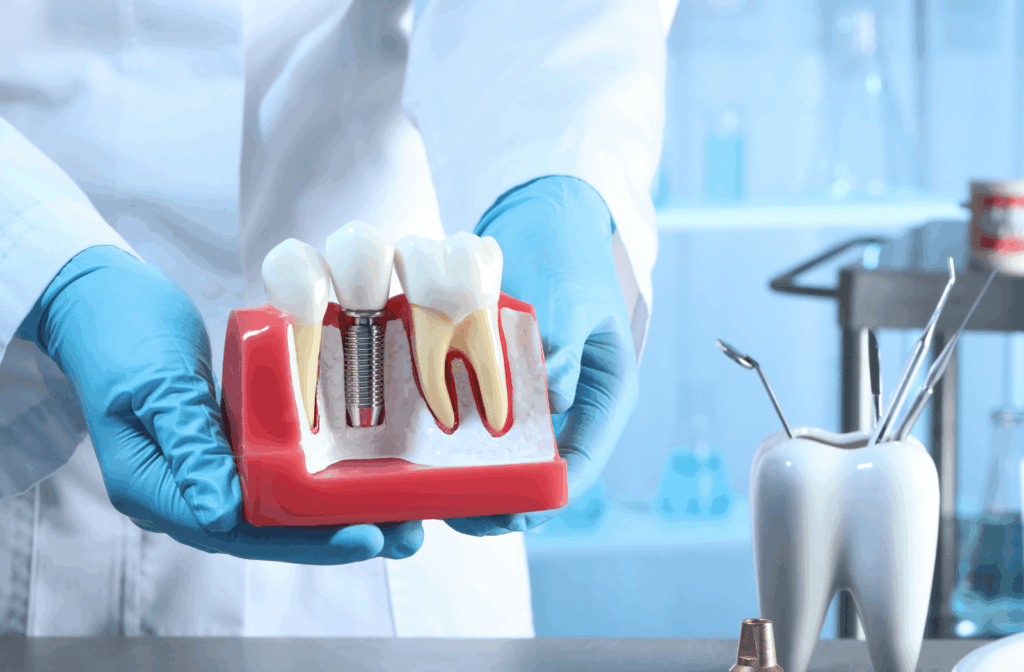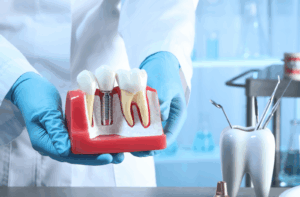Protecting More Than Just Your Smile
When people think about missing teeth, they often focus on the visible effects — gaps in the smile, difficulty chewing, or speech changes. But beneath the surface, a more serious problem begins to develop: bone loss in the jaw.
This gradual loss of bone density can affect facial shape, oral health, and long-term stability of your remaining teeth. Fortunately, modern dentistry offers a proven solution that not only restores your smile but also helps preserve your jawbone and dental implants.
At Coast Dental Centre, your trusted Dentist in Maple Ridge, we help patients understand how implants support both oral function and bone health, providing results that look, feel, and function like natural teeth.
Why Bone Loss Happens After Tooth Loss
Your jawbone plays a vital role in supporting your teeth, but your teeth also help maintain the strength of your jawbone. Each time you chew or bite, pressure travels through the roots of your teeth into the bone, stimulating it and keeping it strong.
When a tooth is lost or extracted, that stimulation disappears. Without regular activity, the bone in that area begins to break down in a process called resorption.
Within the first year after losing a tooth, patients can lose up to 25% of the bone’s width, and the process continues over time. Bone loss doesn’t just affect appearance — it can lead to shifting of nearby teeth, bite problems, and difficulty wearing dentures or other restorations.
How Dental Implants Work
Dental implants are designed to replace both the visible part of the tooth (the crown) and the root beneath the surface. The implant itself is a small titanium post that fuses with the jawbone through a process known as osseointegration.
Once the implant integrates securely into the bone, a custom-made crown, bridge, or denture is attached to complete the restoration.
Because implants mimic natural tooth roots, they restore chewing function and transmit the same kind of pressure that stimulates bone growth. This makes them the only tooth replacement option that actively prevents bone loss.
The Role of Dental Implants in Preserving Bone
1. Restoring Natural Function
Unlike traditional dentures or bridges, dental implants engage directly with the jawbone. Every time you chew, the implant acts like a natural root, sending signals to the bone to keep it strong and healthy.
2. Preventing Bone Shrinkage
When bone resorption occurs, the jaw begins to shrink, which can change facial appearance. Implants prevent this process, helping you maintain facial contours and a youthful look.
3. Supporting Adjacent Teeth
Missing teeth can cause surrounding teeth to shift toward empty spaces, leading to misalignment and uneven wear. Implants fill those spaces and stabilize your entire dental structure.
4. Enhancing Long-Term Oral Health
Because dental implants preserve bone density, they also help protect your gums and neighbouring teeth. This creates a healthier foundation for your entire mouth.
Comparing Implants with Other Tooth Replacement Options
Traditional tooth replacements, such as bridges or removable dentures, restore appearance and basic function, but they don’t address bone loss.
| Treatment Option | Prevents Bone Loss | Stability | Longevity |
| Dental Implants | Yes | Fixed and secure | 20+ years |
| Dental Bridge | No | Fixed but supported by nearby teeth | 10–15 years |
| Removable Denture | No | May loosen over time | 5–8 years |
If you’re missing one or more teeth, dental implants offer the most complete solution — both for aesthetics and for long-term bone preservation.
Signs of Bone Loss in the Jaw
Bone loss often develops slowly, making it difficult to notice until significant changes occur. Some common signs include:
- Loose or shifting teeth
- Receding gums or a “sunken” facial appearance
- Changes in bite or jaw alignment
- Difficulty wearing dentures
- Jaw discomfort or clicking sounds
If you experience any of these symptoms, it’s important to see your Dentist in Maple Ridge for a comprehensive evaluation. Digital X-rays and 3D imaging can help assess bone density and determine the best treatment options.
The Dental Implant Process at Coast Dental Centre
1. Consultation and Assessment
Your implant journey begins with a detailed consultation. Your dentist will evaluate your oral health, bone quality, and overall medical history to ensure implants are right for you.
2. Implant Placement
The implant post is placed into the jawbone under local anesthesia. The procedure is precise and comfortable, often performed in a single visit.
3. Healing and Integration
Over the next few months, the bone naturally grows around the implant, securing it firmly in place. This phase is crucial for long-term success.
4. Restoration
Once healed, a custom crown, bridge, or denture is attached. The result looks and feels just like a natural tooth.
Your Dentist in Maple Ridge will monitor healing closely and ensure your bite is balanced and comfortable.
Who Is a Good Candidate for Dental Implants?
Most adults with healthy gums and sufficient bone density are excellent candidates for implants. Even if you’ve experienced bone loss, advanced techniques like bone grafting can rebuild the foundation needed for successful placement.
You may be a good candidate if you:
- Have one or more missing teeth
- Want a long-term, fixed replacement solution.
- Don’t want to rely on a removable denture.s
- Have healthy gums and overall good oral hygiene
- Are committed to regular dental care
If you’re unsure whether implants are right for you, your dentist can assess your individual situation and discuss options for restoring your smile.
Caring for Your Dental Implants
Dental implants are designed to last for decades with proper care. Follow these tips to keep them healthy and strong:
- Brush and floss daily to prevent plaque buildup
- Visit your dentist regularly for checkups and cleanings.
- Avoid smoking, which can interfere with healing.
- Use a soft-bristled toothbrush and non-abrasive toothpaste.
- Report any discomfort or movement to your dentist right away.
Good oral hygiene ensures that both your implants and surrounding gums remain in excellent condition.
The Lifelong Benefits of Dental Implants
Choosing dental implants is an investment in your oral health and confidence. Beyond preventing bone loss, implants offer several long-term advantages:
- Natural appearance and feel
- Improved speech and chewing ability
- Stability without adhesives or slippage
- Enhanced self-esteem and quality of life
At Coast Dental Centre, we take pride in helping patients achieve smiles that are not only beautiful but also strong and healthy from the foundation up.
Restore Strength and Confidence to Your Smile
Bone loss after tooth loss can seem inevitable, but with the right solution, you can preserve both your smile and your jaw health for years to come.
If you’re missing one or more teeth, schedule a consultation at Coast Dental Centre, your trusted Dentist in Maple Ridge. Discover how Dental Implants Maple Ridge can restore your smile, protect your jawbone, and improve your confidence with results that feel as natural as your own teeth.



